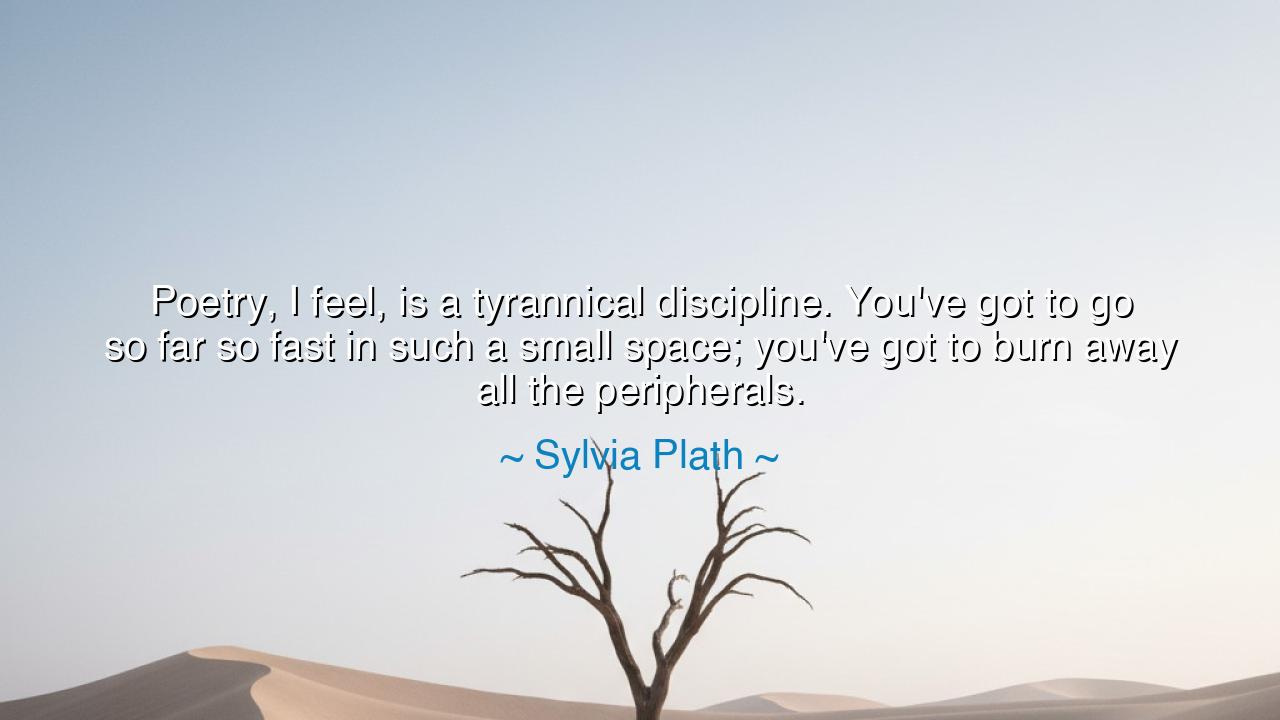
Poetry, I feel, is a tyrannical discipline. You've got to go so
Poetry, I feel, is a tyrannical discipline. You've got to go so far so fast in such a small space; you've got to burn away all the peripherals.






Hear, O children of the written word, the wisdom of Sylvia Plath, whose voice still echoes through the chambers of time, calling us to grasp the heart of poetry. She declared, "Poetry, I feel, is a tyrannical discipline. You've got to go so far so fast in such a small space; you've got to burn away all the peripherals." These words, though brief, carry within them the weight of a thousand truths. Plath speaks not only of the craft of poetry but of the very nature of artistic creation itself, where the forces of time, brevity, and discipline collide. To create something profound, she teaches us, is no simple task — it is a battle, a struggle against the very fabric of the world that seeks to dilute and distract.
In her statement, Plath reveals a deep understanding of the intensity required in the art of poetry. It is not a form for the faint-hearted, nor for those who seek to wander idly in the garden of words. Poetry demands precision. In a single line, a poet must carry the weight of an entire world. The language must be distilled, focused, its meaning sharp like a sword's edge. In the space of a few lines, a poet must traverse vast landscapes of emotion, experience, and truth, all while maintaining a pace so swift that each word must work harder than any that came before it.
The tyrannical nature of poetry, as Plath sees it, is the demand it places upon the soul of the poet. There is no room for meandering thoughts, no space for frivolous indulgence. Every word must serve a purpose; every line must carry weight. The poet is forced to burn away the superfluous, to purge the unnecessary, to extract only the essence of what must be said. This is why the poet’s craft is likened to a trial by fire, for in the process of creating something so pure, much must be sacrificed. Only by casting aside the extraneous details can the poet arrive at the true core of the message, that which resonates with the deepest part of the human experience.
Reflect upon the life of the great Homer, the blind bard of ancient Greece, whose epics of the Iliad and the Odyssey have endured through the ages. His was a poetry that moved at lightning speed, each line carrying monumental weight. In these tales, Homer did not have the luxury of languishing in description or unnecessary detail. Every word was a deliberate choice, each one designed to propel the narrative forward, to convey the passions of gods and mortals alike. His poetry, though filled with epic grandeur, was also tightly woven, not one thread out of place. Homer knew that to capture the vastness of the human soul, to speak to the essence of love, honor, and tragedy, he must distill everything to its most potent form.
This concept of poetry as a ruthless discipline is not merely an abstraction, but a hard truth that all creators must face. In every art, the path to greatness is marked by the sacrifice of ease and the shedding of excess. Think of the sculptor who chisels away at the stone, removing piece after piece until, at last, the figure emerges. The poet too must chisel away at their words, carving and shaping until they find the true shape of meaning. The struggle is in the sacrifice, the relentless drive to reveal the purest form of thought and feeling, to lay bare what others may not see or understand.
The lesson of Sylvia Plath’s words is thus twofold: first, that true artistic mastery is forged through discipline — the kind of discipline that strips away the trivial, leaving only the profound. Secondly, that the artist must be both patient and ruthless in their pursuit of truth. To be a poet, or to be any kind of creator, is to be forever engaged in a battle with oneself, a battle to refine and distill the unspoken emotions of the heart into a form that others can understand and feel deeply.
And so, let us take these teachings into our own lives. Whether you are a poet, a painter, a sculptor, or a seeker of truth in any form, know that the path to greatness lies in the rigorous elimination of the unnecessary. Look within, and ask yourself: What must I cast away to reach the heart of my work? What distractions must I burn away to find the core of my being? Time is short, and our lives are fleeting, so let us make every word, every action, every thought count.
The poet’s tyranny, as Plath so rightly calls it, is not a curse but a blessing. It is the fire that refines the gold, the pressure that turns the lump of coal into a diamond. In the end, it is through the discipline of burning away the unnecessary that we find the truth, the beauty, the essence that lies at the heart of our creative souls. May we all find the courage to embrace this challenge, to refine our craft, and to speak with power and clarity, leaving only the purest words behind for the world to hear.






AAdministratorAdministrator
Welcome, honored guests. Please leave a comment, we will respond soon